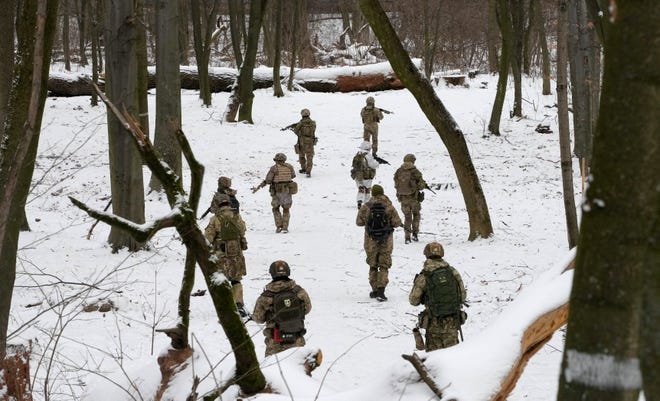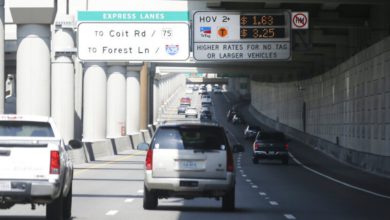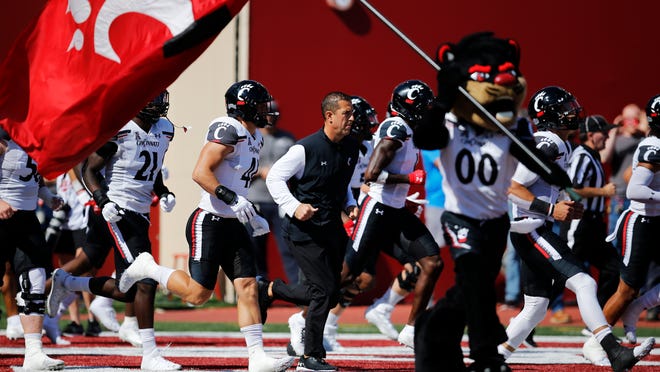
- State Department on Sunday moved to send home nonessential people at the US Embassy in Kyiv.
- Secretary of State Antony Blinken said "choice is Vladimir Putin's" on whether a battle was coming.
- Russia has repeatedly said Ukraine's drift toward NATO is a threat to its national security.
WASHINGTON — The State Department on Sunday told staff at the U.S. Embassy in Ukraine that their families must go home, and the department warned travelers to avoid the country "due to the increased threats of Russian military action."
The order came hours after Secretary of State Antony Blinken reiterated that the U.S. and NATO will forcefully support Ukraine should Russian troops invade.
"If a single additional Russian force goes into Ukraine in an aggressive way, as I said, that would trigger a swift, a severe and a united response from us and from Europe," Blinken said during a CNN interview.
While Blinken reemphasized that the U.S. is interested in a diplomatic solution to the conflict, he stressed "the choice is Vladimir Putin’s" as to whether war in Ukraine is inevitable.
On Friday, Blinken met with his Russian counterpart, Foreign Minister Sergey Lavrov, for the latest bilateral talks to find a diplomatic solution to the crisis.
Blinken conceded the Kremlin may be "simply going through the motions and it won't affect their ultimate decision about whether to invade" during an interview NBC News "Meet the Press" on Sunday. He later added he is "very convinced" of a "united response" to any Russian actions from all NATO members.
Blinken's statements coincided with Western countries ramping up direct military aid to Ukraine while Russian troops amass on the eastern European country's borders.
The U.S. is threading a delicate needle. While offering a diplomatic off-ramp to Russian leaders, Biden administration officials are suggesting the U.S. would support an insurgency in Ukraine should Russia invade the country, according to a report Wednesday in the New York Times.
The top diplomat's trip last week to Ukraine and Germany is part of broader engagement between the West and Russia, after talks between the two countries hit a wall earlier in January. Russia has repeatedly said Ukraine's drift toward the West and NATO is a threat to its national security and that it is willing to use force to reverse the country's trajectory.

American and Russian officials have been increasingly pessimistic about the possibility of a diplomatic resolution to the conflict, with one Russian diplomat saying last week that talks between the two sides were at a "dead end.”
Here's what we know about the standoff between Ukraine, NATO and Russia and the role of the United States:
State Department draws down staff in Kyiv
The State Department on Sunday ordered the families of all American personnel at the U.S. Embassy in Ukraine to leave the country. It also said that nonessential embassy staff could leave Ukraine at government expense.
The move came amid rising tensions about Russia's military buildup on the Ukraine border that were not eased during talks Friday between Blinken and Lavrov in Geneva.
State Department officials stressed the Kyiv embassy will remain open and that the announcement does not constitute an evacuation. The move had been under consideration for some time and does not reflect an easing of U.S. support for Ukraine, the officials said.
In a statement, the State Department said: “The security conditions, particularly along Ukraine’s borders, in Russia-occupied Crimea, and in Russia-controlled eastern Ukraine, are unpredictable and can deteriorate with little notice. Demonstrations, which have turned violent at times, regularly occur throughout Ukraine, including in Kyiv."
The department's travel advisory, which had warned against traveling to Ukraine because of COVID-19 as well as the tensions over Russia, was changed Sunday to carry a stronger warning.
“Do not travel to Ukraine due to the increased threats of Russian military action and COVID-19. Exercise increased caution in Ukraine due to crime and civil unrest. Some areas have increased risk," the department advised.
Biden: Russia to face 'stiff' toll should it invade Ukraine
President Joe Biden cautioned Wednesday in a press conference at the White House that Russian President Vladimir Putin is likely to invade Ukraine.
"Militarily, they have overwhelming superiority in relation to Ukraine," Biden said of Russian power. "But they’ll pay a stiff price immediately, medium-term and long-term if they do it."
Biden was clear about his relationship with Putin, noting the two have had "frank discussions" and understand each other's positions. Biden reiterated the assessment of his senior national security aides that Russia can now “at any point launch an attack on Ukraine.”

While he said he isn't certain of Putin's moves the president ventured, "my guess is he will move in," on Ukraine. Biden cautioned, however, that Russia would face severe losses on the battlefield and economically if that happened.
Biden said it would be a "disaster for Russia."
“You can go in and, over time, at great loss and economic loss, go in and occupy Ukraine. But how many years? One, three, five, 10? What is that going to take? What toll is that going to take? It’s real, it’s consequential. So this is not all just a cakewalk for Russia.”
"If they invade, they're gonna pay," Biden said, referencing economic sanctions that would functionally lock Russian financial institutions out of the SWIFT system, which enables global finance. "Their banks will not be able to deal with dollars."
Biden also speculated that Putin's actions were motivated by a deep sense of loss over the collapse of the Soviet Union, which Putin has repeatedly called a "genuine tragedy." Ukraine declared independence in 1991 as the Soviet Union dissolved.
"He is trying to find his place in the world between China and the West," Biden theorized, noting that while countries like Ukraine were now sovereign from "Mother Russia," Biden urged Putin "to look at what he does have," including a vast country spanning eight time zones, he noted.
During his remarks, Biden implied that a NATO response may differentiate based on whether or not Russia engages in a "minor incursion," a distinction that set off alarm bells in Ukraine, promoting Ukrainian President Volodymyr Zelensky to scold Biden on Twitter.
Shortly after Biden's press conference, White House press secretary Jen Psaki issued a statement reiterating that "if any Russian military forces move across the Ukrainian border, that's a renewed invasion, and it will be met with a swift, severe, and united response from the United States and our Allies" after criticism from allies.

Blinken: Russia positioned for 'aggressive action'
U.S. intelligence estimates that Moscow has stationed at least 100,000 troops on its border with Ukraine. The Russian military has also set up the logistical infrastructure that would be necessary to quickly invade the country.
Around 20,000 troops are stationed across the border from two rebel provinces in Ukraine, Donetsk and Luhansk. Russia has supported separatist fighters since its 2014 annexation of Crimea, which continues to host military forces amid the latest build-up.
“We know that there are plans in place to increase that force even more on very short notice,” Blinken said during a Wednesday press briefing in Kyiv. He added that the buildup "gives President Putin the capacity, also on very short notice, to take further aggressive action against Ukraine.”
On Jan. 14, the Ukrainian government says it was attacked by a hacker group known as UNC1151, vandalizing several government websites. “Be afraid and expect the worst,” one post published to the Ukrainian Foreign Ministry website read. Ukrainian and U.S. officials suspect that while attacks were carried out by UNC1151, which has been connected to Belarusian intelligence agencies, the sabotage was likely ordered by Russia.
Russia has also stationed troops in Belarus, to Ukraine's north, setting up the prospect of an invasion of the country from three sides.
U.S. intelligence agencies have accused Russia of planning sabotage and terror attacks within Ukraine that the Russian military would use as a pretext for invasion.
Western diplomatic envoys in Kyiv
Blinken is not the only diplomat engaging with Russia and Ukraine as tensions rise. Canadian Foreign Minister Mélanie Joly strongly condemned Russian aggression toward Ukraine while announcing the Canadians will be sending special forces to Kyiv.
French and German diplomats have also been dispatched to Ukraine to reassure the country of Western support.
French President Emmanuel Macron said Wednesday that the European Union, which Russia has sidestepped in talks so far, must draft a plan separate from Washington to address the possibility of the “most tragic thing of all – war."
The Baltic nations of Estonia, Latvia and Lithuania — each post-Soviet states that have joined NATO — announced they will send weapons and other aid to Ukraine with U.S. endorsement.
The United Kingdom announced it will send anti-tank weapons to Ukraine and will draft plans to support an insurgency. On Saturday, the U.K. government also released a statement saying that Moscow is drafting plans to install a pro-Russian government in Kyiv through subversive tactics and regime change.
The statement named several Ukrainian politicians the Kremlin was considering to install as puppet leaders, writing that the information "shines a light on the extent of Russian activity designed to subvert Ukraine, and is an insight into Kremlin thinking.
The efforts underscore the concentration of diplomatic overtures to Ukraine after a week when negotiations to head off a Russian attack collapsed with Moscow.
US senators visit Kyiv
Back in Washington, a bipartisan delegation of senators returned Tuesday night from a 48-hour trip to Ukraine, where they met with Zelenskyy and expressed strong solidarity with Ukraine.
The group included Sens. Richard Blumenthal, D-Conn., Kevin Cramer, R-N.D., Amy Klobuchar, D-Minn., Chris Murphy, D-Conn., Rob Portman, R-Ohio, Jeanne Shaheen, D-N.H., and Roger Wicker, R-Miss.
The White House issued a statement Wednesday stating that President Joe Biden and the senators had a call, where they discussed "the best ways the United States can continue to work closely with our allies and partners in support of Ukraine, including both ongoing diplomacy to try to resolve the current crisis and deterrence measures."
“We need to stand strong and unified in letting Vladimir Putin and Russia know that should there be another physical invasion of Ukraine, the consequences will be devastating for Russia,” said Portman.
Portman later said he was "deeply troubled" by Biden's "minor incursion" remarks, a sentiment echoed by his Republican colleagues who attended the trip. Shaheen, the New Hampshire Democrat, said she remained confident in Biden's commitment to a forceful response while acknowledging that he likely misspoke at his press conference.
On Sunday, Sen. Joni Ernst, R-Iowa, said the US must "be very aggressive in pushing against President Putin," endorsing sanctions on Russian financial institutions and the Nord Stream 2 pipeline project to Europe.
Ernst said the Biden administration "is only just acting on the suggestions coming from Congress" and that more needed to be done to support Ukraine.
Follow Matthew Brown online @mrbrownsir.
Contributing: Associated Press, Michael Collins.









